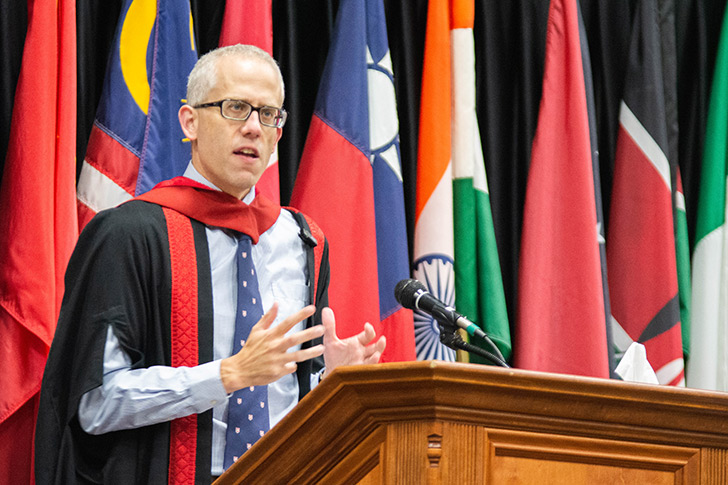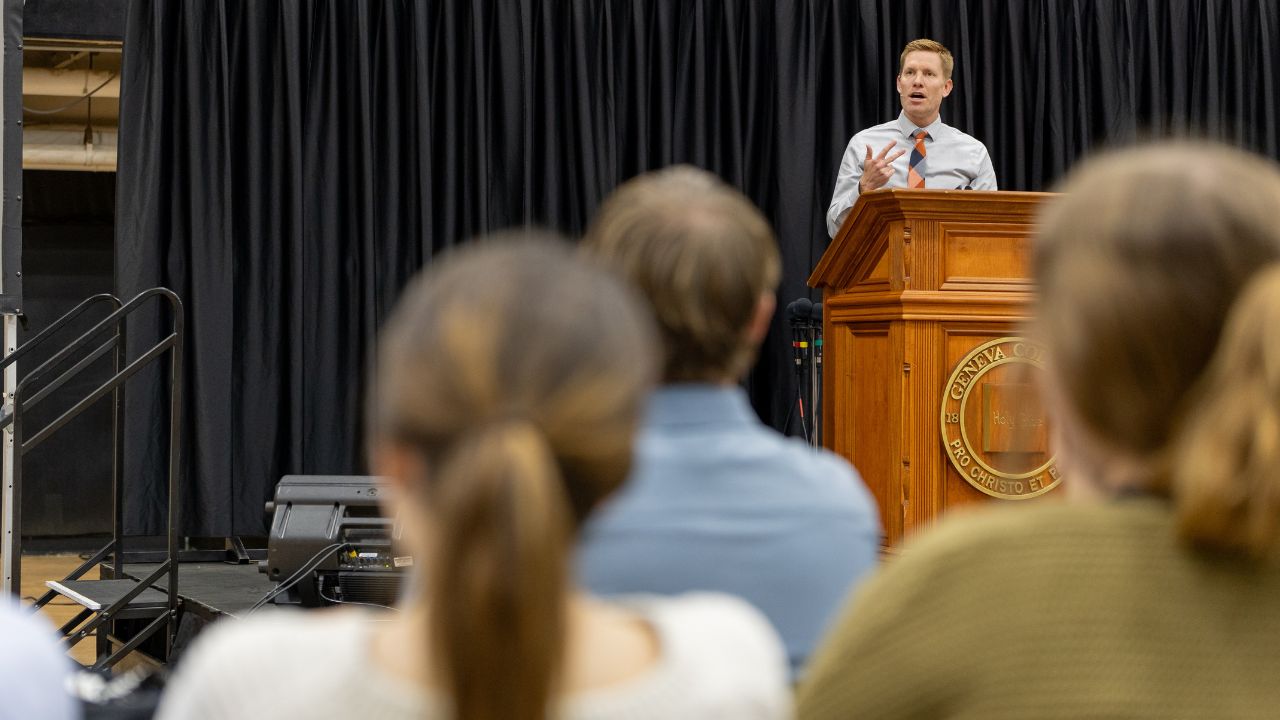
Whatever You Do, Do Not Be True to Yourself
Let me just add my congratulations along with your president, professors, provost, family and friends, and the entire community of Geneva College to you, the class of 2022, on this achievement. It’s a real honor for me to be here to share in this day and to speak for these few moments. I’ve often reflected that giving a commencement address is like giving a sermon at a wedding. No one has really come out to hear what you have to say, but they’re pretty sure you’ll take too long to say it. So, with that in mind, let me try to say something true and helpful… and brief.
Twenty years ago, Anna Quindlen, a writer for the New York Times, Pulitzer Prize winner, and recipient of prestigious degrees, gave this advice to a group of graduating seniors. “Each of you,” she said,
is as different as your fingertips. Why should you march to any lockstep? Our love of lockstep is our greatest curse; the source of all that bedevils us. It is the source of homophobia, xenophobia, racism, sexism, terrorism, bigotry of every variety and hue, because it tells us that there is one right way to do things —to look, to behave, to feel— when the only right way is to feel your heart hammering inside you and listen to what its timpani is saying.
Well, apart from many logical inconsistencies in that statement (not least of which is “there’s no one right way to do things”), I’m going to tell you one now. It’s typical commencement counsel: Follow your dreams… march to the beat of your own drummer… Be true to yourself.
I’d like to offer some different advice: Do not follow your dreams... Do not march to the beat of your own drummer... and whatever you do, esteemed class of 2022, do not be true to yourself.
You say, ‘that needs a little qualification;’ or, ‘that’s perhaps hyperbole[?].’ It is a little hyperbole. And I will give some nuance at the end. But I believe it’s important to state the matter somewhat provocatively. Because if you pay attention (or even if you do not), our world tells us in a thousand commercials, television shows, movies, and songs, that the best way to live —in fact, the only ‘authentic’ way to live—is for you to be you. For you to live out your truth. For you to find your true self and then have the courage to live accordingly.
The Bible tells us, on the other hand, there is a way that seems right to a man, but its end is the way of death - Proverbs 14:12. Think of the story of Esau. My main job is to be a pastor, and I’ve been preaching through the book of Genesis for about half the time you’ve been in college here, for two or three years. Some months ago, I preached the story of Esau and Jacob. Perhaps you remember that Esau sold his birthright for a pot of stew, says Genesis 25. Let me eat some of that red stew. For I am exhausted, I’m about to die, what use is this birthright to me? Esau was literally consumed by his appetites. He was a man defined by his desires and deceived by his desires, which is essential to keep in mind because our world often tells us implicitly, sometimes explicitly, that you simply are what you desire. And to be your authentic self, you must never mitigate or assuage the things you desire.
Esau, in that story, is actually depicted as an animal. You can see this more clearly in the Hebrew text. There’s a play on names with Edom who came out hairy and red, and that’s going to be the name of Esau, and it’s also the name of this stew. He says, Ha’adom, ha’adom - red stuff, red stuff. He’s a man who’s absolutely hungry and is just letting out an animal sort of cry. He’s famished. Like when my children have a meal delayed some 20 minutes, they come and say, “I’m starving.” You think you’re starving? Of course, you’re not. The picture here with Esau. You can almost imagine him wiping off his mouth, throwing down a napkin, and letting out a loud belch as he walks away from the table.
He was not made nobler for satisfying all of his desires. He was made lower. He became like an animal. That’s what the text wants us to see. Red stuff! Red stuff! He’s like an animal. In fact, if you remember, Esau was reputed because he was a skillful hunter. Well, now the skillful hunter has become prey to his own appetites, and he has fallen for the trap set by his younger brother. He has traded one identity for another. He had a better identity, as the firstborn of Isaac, the grandson of Abraham, could have been, should have been heir to the promises, but he gave that away and traded in another identity because he was enslaved to his desires.
The world tells us that our identity is to be found in what we desire. To deny the fulfillment of what you desire is not just to tell you that you can’t do something; it is to strike a death knell in your truest identity. We are awash in what Carl Truman calls expressive individualism. You are, what you feel, and don’t let anyone tell you otherwise. Perhaps you’ve come across this theological nugget before. It’s time to see what I can do to test the limits and break through – No right, no wrong, no rules for me, I’m free. Let it go. Let it go.
Throughout most of history, philosophers and theologians have distinguished very carefully between affections and passions. Some of you had to read in the course of your studies Jonathan Edwards’ famous book, “Religious Affections,” there’s a reason it is affections. He doesn’t mean the same thing as emotions. The word emotion is the best we can figure maybe a late 18th Century 19th Century invention, whereas before, theologians and philosophers had a whole host of terms, passions, affections, and sentiments. Affections were considered motions of the will. Passions, just think of the word. They rendered you passive. They were the things that swept over you.
This is why the Westminster Confession (in a statement that’s confusing to many people) says God is without parts or passions. What does that mean? We think a passion is something good, intense zeal, enthusiasm. You don’t want to live life without passion. What it says is that God is without parts, meaning he’s simple. He’s not metaphysically compound. He’s without passions, meaning things don’t ever just happen to God. He is never rendered passive. He is, the philosophers would say, pure act. Nothing happens to Him. He is not innert or immobile. In fact, He’s so active all the time that His activity can never increase or decrease. Nothing happens to Him. He does not have passions. In the Western tradition, especially the Christian tradition, then there has been an insistence that we must tame these lower appetites and constrain them by reason and by the grace of God.
The reformed tradition goes even one step farther to say, well, it’s not just our lower appetites, sort of the drive for food or for sex that can be out of control, but actually, our reason itself is not entirely reliable, and our wills, apart from Christ, are bound to sin. Most people you encounter in life, and maybe some of you here today, operate with an unspoken assumption that shapes and defines every argument, every instinct, and the way people look at themselves. Here’s the simplest way to put this very deep, yet rather simple, philosophical assumption that most everyone today assumes: “is equals ought.” That is, there doesn’t even refer anymore to your body. It might be helpful to say your body has certain givens to it that tell you the sort of person that you are. No, the IS has become something entirely subjective. It’s now assumed that what you feel about yourself, what you believe about yourself, and what you perceive about yourself tells you who you are and how you should behave; “is equals ought.” Who you are, what you feel about yourself, and what you perceive about your identity is what you ought to be. This is what I feel like. This is what I should do. And if you tell me to do something other than what I feel, you’re not just telling me to try to control a desire. You are really attacking the very heart of my personhood.
Now, what’s wrong with this assumption, besides being devoid of any real objective or empirical or scientific fact? While the assumption is entirely at odds with Christian anthropology, with the way the Bible tells us we should look at ourselves, “is equals ought” might be true, except we have a doctrine of the fall. You can say that whatever you feel you should do, and whatever you think about yourself, you are, and whatever you believe is your identity if our instincts are never self-deceived if our desires are never self-centered, if our dreams are never self-destructive. But in Adam’s fall, we all sinned, and so we’re not the people that we ought to be. Our IS, apart from Christ, is not the right OUGHT. That means this salvation that we need, and deep down, everyone knows we need something.
I’ve never met somebody who says I’m perfect. Everyone says, “Of course, I’m not perfect, but they’re grading on a scale.” Sort of Hitler, Stalin, down here and you, grandma, Jesus, all sort of bunched up near the top. They say I’m not grandma or Jesus, but the really bad people are down here. We know something’s not right. The salvation we need must be found outside of ourselves with every sort of after-school special I grew up with, and all the sorts of kids’ movies you grew up with probably told you to look deep within yourself for that salvation.
There’s a classic paragraph from G.K. Chesterton written over 100 years ago. He says that Jones shall worship the God within turns out ultimately to mean that Jones shall worship Jones. Let Jones worship the sun or moon anything rather than the inner light. Let Jones worship cats or crocodiles, if he can find any, but not the God within. Christianity came into the world, firstly, in order to assert with violence that a man had not only to look inwards, but to look outwards, to behold with astonishment and enthusiasm, a divine company and a divine captain, the only fun of being a Christian, was that a man was not left alone with the inner light, but definitely recognized an outer light fair as the sun, clear as the moon, terrible as an army with banners.
Now, like most heresies that the world believes, they believe it because there’s something partially true. This “is equals ought” assumption does grasp something true, namely, that our ethics must be rooted in our ontology. That’s just a fancy way of saying our identity does shape our obligation. So “is” does equal “ought” if you have a doctrine of sin, a doctrine of regeneration union with Christ, and the indwelling of the Holy Spirit. In other words, if you’ve been made new, and the old person is gone, and the whole, you’ve been brought to newness of life in Jesus Christ, and actually, the New Testament does tell you that you should be yourself. To quote that great theologian of our age, Lady Gaga, she may be right that you were born that way, but the good news of Jesus Christ is that you can be born again in a different way.
Think about two Pixar movies that came out 10 years apart… Sorry, I have nine children. In a movie review for World Magazine recently, Colin Garbarino pointed out the difference between “Brave (2012)” and “Turning Red (2022).” Both movies are coming-of-age movies with mother-daughter conflict, something you know nothing about. In both movies, the daughters want to try to find themselves. In both movies, they feel constrained by an overbearing mother. And actually, in both movies, believe it or not, the mother gets turned into an angry, out-of-control bear. So, they have a lot in common in Turning Red. However, the basic message is one of self-actualization. How we have a messy side. We need to let out stories about this sort of family curse, and when you get angry, you turn into a red panda. At one point that the daughter tells her mom, my panda, my body, which is a not-so-subtle echo of my body, my choice. We are supposed to accept that the daughter turns into a red panda as her mom does. It is right to chart her own path as long as she is true to herself. My Panda, my choice, I need to let the messiness out.
But if you remember, perhaps having seen the movie Brave, the narrative arc was much different there. The mother and daughter realize that they’ve gotten into the predicament they’re in because they have both been proud. And there’s a torn tapestry, which is a symbol in the movie for their broken relationship. They must mend the bond torn by pride. The lesson in Brave is about learning to say you’re sorry. It’s a fun adventure movie, of course, when you watch it, but it’s actually about repentance, forgiveness, and change. It’s really about how being true to yourself can get you in trouble and really hurt people around you. So, both the daughter and the mother had to realize that they were both proud of the ways that they were having conflicts with one another and mend the bond torn by pride. They need to let something go of themselves, not just let it go.
Recall the line I started with from Anna Quindlen, the only right way to behave is to feel your heart hammering inside you and listen to what its timpani is saying. Well, here is a better line from Rich Mullins, way back from even before I was in college. He said in his song,
“They said, Boy, you must follow your heart. But my heart just led me into my chest. They said follow your nose. But the direction changed every time I went and turned my head. And they said Boy, you just follow your dreams. But my dreams were only misty notions, but the father of hearts and the maker of noses and the giver of dreams. He’s the one I have chosen, and I will follow him.”
So let me bring this to a close —which is the old preacher trick for saying hang on a few more minutes. I promised at the beginning some nuanced because I entitled this message whatever you do, don’t be true to yourself. Now the nuance here is that, of course, if you are truly born again, and belong to Christ, then one of the chief ethical motivations and all the New Testament is very simply: be who you are. You should be true to yourself, but not your old self. You should be true to yourself if you have died to your old self, and your new self has now been raised with Christ and is now seated with Him in the heavenly places. The real you is worth letting out if the old you is dead to sin, and the real you is alive to Christ.
The world says, “You are what you feel.” The world says, “Is equals ought.” The world says, “You must find yourself, be true to yourself, and above all, express yourself.” Let me end with the words of Jesus, who points out us in a different direction and gives us a much better way to live. “Truly, truly I say to you, unless a grain of wheat falls into the earth and dies, it remains alone. But if it dies, it bears much fruit. Whoever loves his life will lose it. Whoever hates his life in this world will keep it for eternal life.” God bless.
Opinions expressed in the Geneva Blog are those of its contributors and do not necessarily represent the opinions or official position of the College. The Geneva Blog is a place for faculty and contributing writers to express points of view, academic insights, and contribute to national conversations to spark thought, conversation, and the pursuit of truth, in line with our philosophy as a Christian, liberal arts institution.
May 18, 2022The CollegeRelated Blog Posts
Request Information
Learn more about Geneva College.
Have questions? Call us at 724-847-6505.











 Online Course Login
Online Course Login